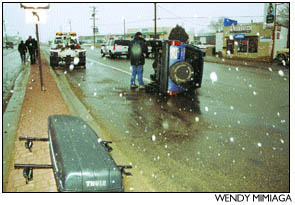|
Jan. 11, 2001 by Aspen C. Emmett
The Four Corners’ wintry roads and scenic off-roading may entice residents of the area to purchase four-wheel-drive and sport-utility vehicles (SUVs). However, some of these popular vehicles are not so popular with the new rollover-resistance ratings released by the U.S. Department of Transportation on Tuesday. Based on the study conducted by the National Highway Transportation Safety Administration, most rollovers occur when a vehicle runs off the road and strikes a curb, soft shoulder, guard rail or other object that "trips" it. According to the report, taller, narrower vehicles such as SUVs are more likely than lower, wider vehicles, such as passenger cars, to trip and roll over once they leave the roadway. Receiving the two worst ratings with a rollover rate of greater than 40 percent in single-vehicle accidents were the Chevrolet Blazer and the GMC Jimmy. Top honors went to the Honda Accord with a rollover risk of less than 10 percent. A full list of the rollover resistance ratings can be obtained at www.nhtsa.dot.gov. Regardless of the statistics, SUVs remain the popular choice of vehicle in the Southwest, said Chris Neely, business manager at Graffis Motors. "We sell a lot of trucks and SUVs," Neely said. "Definitely more of those than cars." He said people often choose SUVs because of the protection the larger vehicles offer in collisions. "I don’t think it (the rollover reports) affect the sales (of SUVs) really," Neely said. "Probably because of people’s concepts of what’s going to happen to them if they’re in a collision — they’d like to be up a little higher for that reason rather than in a car." Colorado State Trooper David Kucera agreed with Neely about SUVs’ protection in collision accidents, but added that the characteristics that make the SUVs safer in collisions make them that much more dangerous in rollover accidents. "They can be safer just because of the bulk size, as long as you’re wearing your seat belt," Kucera said. "But since they are a greater weight, it’s obviously going to take them a greater distance to brake." He said the extra distance the larger vehicles take to stop can make a big difference in whether the vehicle goes off the roadway. "Once you go off the roadway, your odds of rolling are greater," Kucera said. "Once you hit an embankment or a rock, that’s what causes your car to roll, and unfortunately with the SUVs, when they go off the roadways, they probably have a little bit more speed (because of the weight)." Despite a vehicle’s rollover-resistance rating, Kucera said the most important factor in accidents is the person behind the wheel. He said people’s attitudes and sense of security in the larger vehicles with four-wheel-drive and front-wheel drive often contribute to accidents when road conditions are less than ideal. "They have a tendency to speed a little bit faster," Kucera said. "It might get them up to a speed quicker, but unfortunately, when it comes to stopping, it doesn’t matter whether you have four-wheel drive, traction control, front-wheel drive, rear-wheel drive — you’re going to spin out just as quick, no matter what kind of suspension you have." Kucera said he doesn’t particularly like reports such as the one issued Tuesday concerning rollovers. "They have abstract numbers that are based upon height, width and weight," he said. "They never calculate human factors. "It always comes back to the person behind the wheel," Kucera said. "They’ve got to take responsibility for their driving. People try to blame it on the weather, the vehicle or the road. Those are inanimate objects. It’s the people that are actually in control of the vehicle." He said the last storm system to hit the Four Corners on Tuesday triggered a large number of accidents. "Predominantly, almost all of them were rollovers, and it was all because people were just going too fast," Kucera said. "And unfortunately almost all of them were sport-utility vehicles." |
||
|
Copyright © 2001 the Cortez Journal.
All rights reserved. |
